Black Nationalism
The 1920s were a period of tremendous growth in Black nationalism around the country. As Black migrants came north they faced massive hostility from whites who “feared competition over jobs, housing, political power, facilities for education, transportation, and relaxation.” Rather than accept this hostility passively, Black migrants formed organizations to fight back and win demands for racial equality. This activity was part of what has widely been called “the New Negro Movement” and in Detroit Black nationalist organizations were a major part of the movement, especially Marcus Garvey’s Universal Negro Improvement Association and the Nation of Islam.
A.D. Williams founded the Detroit branch of the Universal Negro Improvement Association, after he returned from a UNIA convention in New York in 1920. With a red, Black, and green flag, Williams walked through the streets of Black neighborhoods, playing the tambourine, and preaching the messages of the UNIA. Building a base this way, the UNIA headquarters in New York assigned F. Levi Lord to go to Detroit and oversee the creation of UNIA Detroit Division NO. 407. Its president was Patrick W. Meyers, Vice-president L.K. Nerks, and Reynold Smith served as secretary. The Detroit UNIA purchased a building at 1516 Russell Street, Liberty Hall, which served as a meeting place for Detroit locals. It housed a restaurant that was primarily a way to raise funds for the UNIA’s Black Star Line and serve members.
In 1922 the UNIA arranged a three-day speaking trip to Detroit for Marcus Garvey. Reflecting on his visit, Garvey said that more than 2,000 people came each night to Turner Hall and 4,000 came to Arcadia to hear him, each paying 50 cents. With attendees staying until midnight on each of the three nights, Garvey was quite impressed with the willingness of Black Detroiters to lend their financial and moral support to the work of the UNIA.
Although the Detroit Branch of the UNIA faithfully gave money to the international headquarters, there were tensions between the local and international leadership. At the 1929 UNIA convention held in Jamaica much of the original Detroit leadership resigned because they believed Garvey was using the organization to advance himself. Following the exodus, most of the remaining members began infighting and the organization went into decline. By 1930 the organization was a shell of its former self.
Despite this short period of existence, the city of Detroit felt the impact of the UNIA through the rest of the twentieth century. Former UNIA member Charles Diggs went on to elected office, as did his son. Another of its members would go on to build the Nation of Islam in Detroit, before moving the organization to Chicago.
Elijah Poole was one of the thousands of young Black people who made their way to Detroit with their family in the 1920s. Born in Georgia in 1897, Poole, his wife Clara, and their children moved to Detroit in 1923. Like so many others, Poole struggled to find work up North and by the time the Depression hit, developed a tendency to bounce from job to job every few months. With his family forced to go on public assistance, Poole began to drink alcoholically. Poole’s father introduced him to a man named Brother Abdul Muhammad in 1931, who had belonged to an Islamic Moorish-American organization named the Moorish-Science Temple of America. Abdul Muhammad introduced Poole to the name W. D. Fard Muhammad.
Building on the popularity of the UNIA and the Moorish Science Temple, W. D. Fard Muhammad developed his own teachings of Islam designed for the here and now salvation of Black Americans. Presenting himself as an intermediary between man and God, Muhammad preached that Black Americans were an original Asiatic race, preached abstinence from alcohol and drugs, and that white people were a race of “devils.” Working as a clothing salesman, he would enter the homes of Black Detroiters, telling them the clothes he sold were the clothes worn by original Black people in the East. Although few bought clothes due to Depression era poverty, they did attend his lectures and meetings, which developed into the Nation of Islam.
Unable to attend the first lectures he heard of due to overcrowding, after two attempts Poole finally attended and enjoyed what he heard so much that he stayed late to meet Fard Muhammad. After shaking his hand, Poole said to Muhammad, “You are that one we read in the bible that he would come in the last days under the name…Jesus. You are that one?” Surprised, Muhammad looked into Poole’s eyes and replied, “Yes I am the One, but who knows that other than yourself, and be quiet.” Poole returned home and began to share with everyone what he had learned at the Nation of Islam meeting.
Believing that he had been called to preach so that he might correct the mistaken lessons of Christianity, Poole began a correspondence with Muhammad, trying to learn all he could. While continuing to attend meetings, Poole sobered up, and encouraged his family to attend as well. During a meeting attended by Clara while Elijah was home attending to their children, Fard Muhammad told Clara that he wanted Poole to begin teaching Islam and that he would provide him with support. At 33 years old, Poole believed he had found his life’s calling and began to talk with all Black people who showed any interest.
In a short matter of time, Fard Muhammad re-named Poole Elijah Karriem and named him ‘Supreme Minister” of the Nation of Islam. Karriem’s quick rise in the ranks created a series of internal fights, with several members and leaders breaking from the Nation of Islam and joining the Moorish-Science Temple. Despite this conflict, by the end of 1932, according to police records, an estimated 5,000-8,000 Black Detroiters were members of the Nation of Islam. This number grew rapidly as Black Detroiters witnessed police harassment of the Nation, harassment that many believed was retaliation for speaking the truth to Black Americans. In preparation for arrest, Fard Muhammad changed Elijah Karriem’s name to Elijah Muhammad and prepared him to lead the Nation in his place.
With Fard Muhammad leaving Detroit for legal reasons and Elijah Muhammad taking his place, infighting continued in the Nation of Islam. Although the movement continued to grow in Detroit, so did the chaos, infighting, and police harassment. In response, Elijah Muhammad moved the headquarters of the Nation of Islam to Chicago in 1934.
Claude Andrew Clegg III, The Life and Times of Elijah Muhammad, Chapel Hill, University of North Carolina Press, 1997
Rod Bush, We Are Not What We Seem: Black Nationalism and Class Struggle in the American Century, New York, NYU Press, 1999
Judith Stein, The World of Marcus Garvey, Baton Rouge, Louisiana State University Press, 1986
Richard Walter Thomas, Life for Us is What We Make it: Building Black Community in Detroit, 1915-1945, Bloomington, University of Indiana Press, 1992
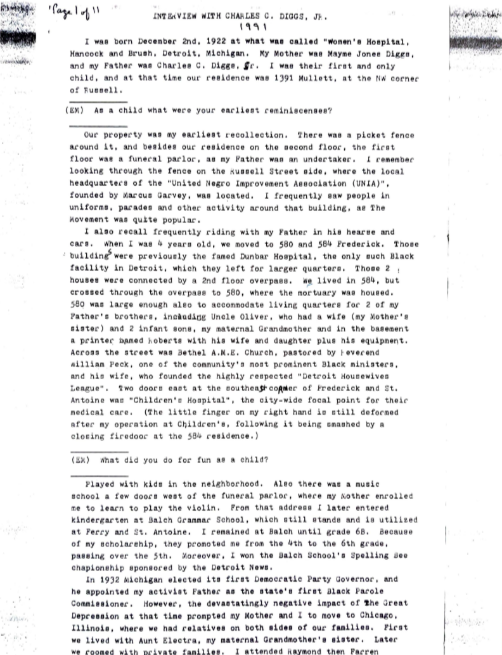
Oral history interview with Rep. Charles C. Diggs, Jr., conducted by Elaine Latzman Moon in 1991. Diggs shares his memories of the Detroit UNIA headquarters on Russell Street on the first page. –Credit: Walter P. Reuther Library, Archives of Labor and Urban Affairs, Wayne State University
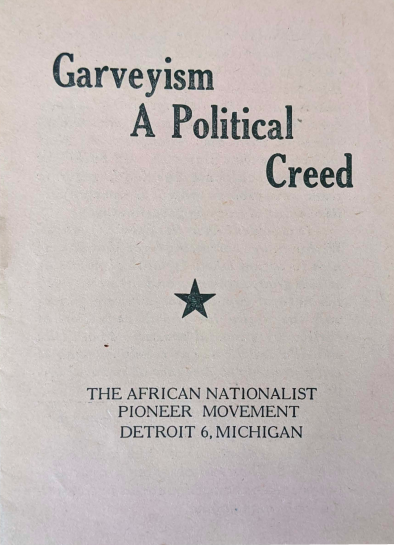
A booklet on the political thought of Marcus Garvey created by the Detroit branch of the African Nationalist Pioneer Movement. The ANPM was an outgrowth of the UNIA founded in New York City by Carlos Cooks after Garvey’s death. –Credit: Walter P. Reuther Library, Archives of Labor and Urban Affairs, Wayne State University
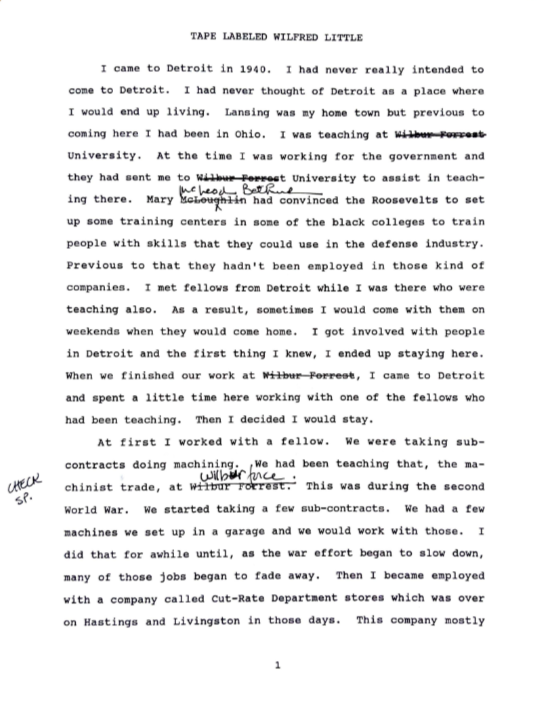
Oral history interview with Nation of Islam member Wilfred Little, conducted by Elaine Latzman Moon sometime between 1989-1994. Little discusses his family’s involvement with the UNIA and the Nation of Islam in Detroit. –Credit: Walter P. Reuther Library, Archives of Labor and Urban Affairs, Wayne State University
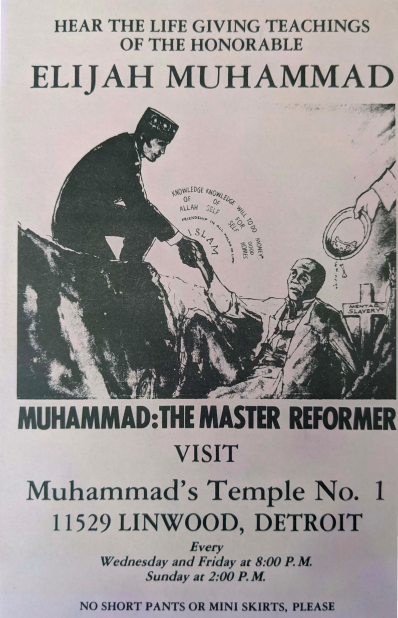
A collection of three flyers inviting people to visit the Nation of Islam’s Muhammad’s Temple No. 1 in Detroit. The Detroit temple was the first established by the Nation of Islam. –Credit: Walter P. Reuther Library, Archives of Labor and Urban Affairs, Wayne State University
Explore The Archives
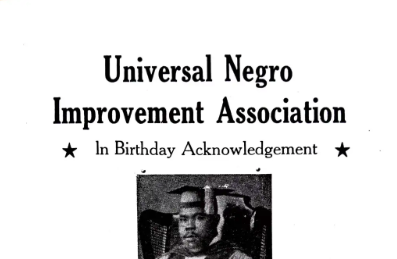
A program for an event hosted by the Detroit branch of the Universal Negro Improvement Association (UNIA) on August 14, 1966 in honor of UNIA founder Marcus Garvey’s birthday. –Credit: Walter P. Reuther Library, Archives of Labor and Urban Affairs, Wayne State University
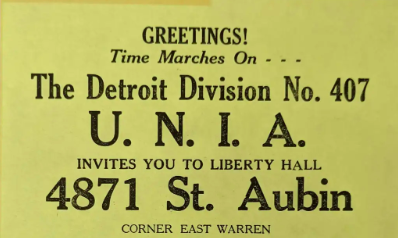
Handbill announcing an event at Liberty Hall in Detroit hosted by the Detroit Division of the Universal Negro Improvement Association (UNIA) on March 28, 1967. –Credit: Walter P. Reuther Library, Archives of Labor and Urban Affairs, Wayne State University
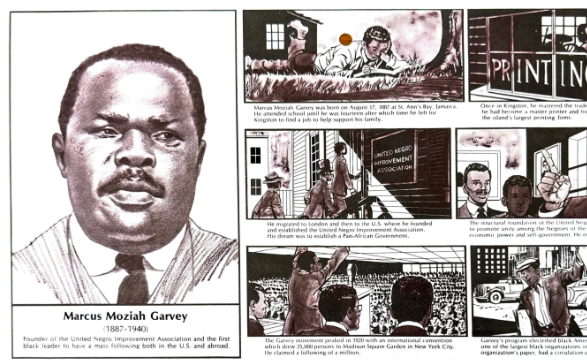
A page from an unmarked calendar depicting and honoring the life of Marcus Mosiah Garvey (1887-1940). –Credit: Walter P. Reuther Library, Archives of Labor and Urban Affairs, Wayne State University
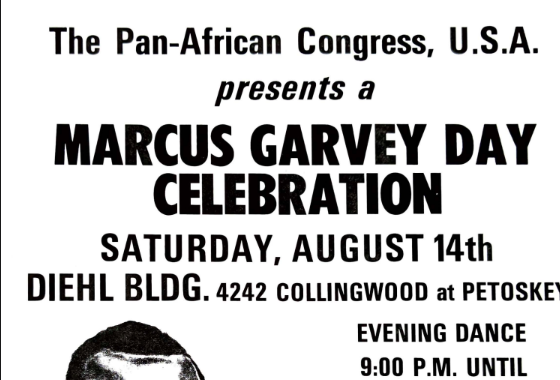
Flyer for a Marcus Garvey Day Celebration hosted by the Pan-African Congress, U.S.A. on August 14, 1971. –Credit: Walter P. Reuther Library, Archives of Labor and Urban Affairs, Wayne State University
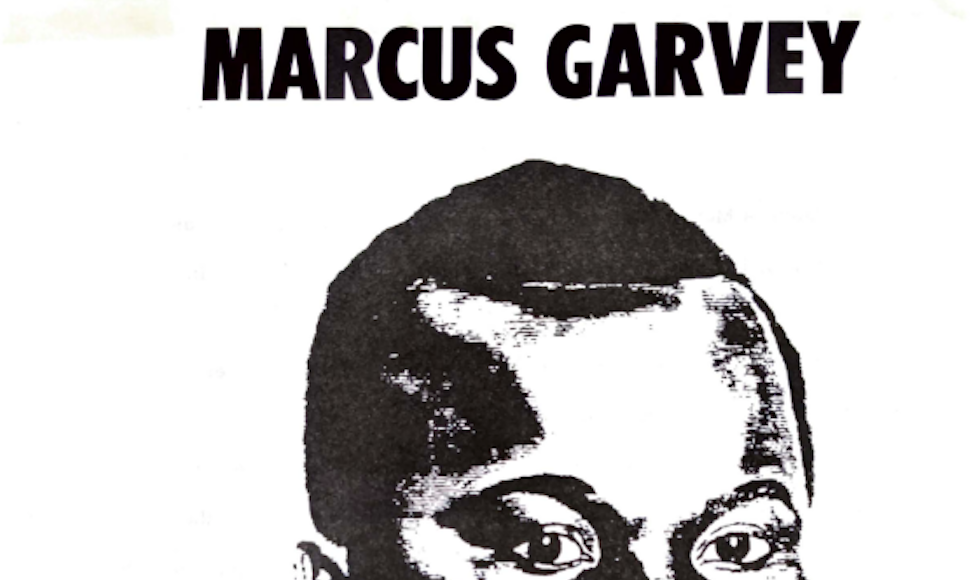
Program for a Marcus Garvey Day Celebration hosted by the Pan-African Congress, U.S.A. on August 14, 1971. The program includes a brief biography of Garvey and his contributions to Black freedom struggles, food menu, and schedule of events. –Credit: Walter P. Reuther Library, Archives of Labor and Urban Affairs, Wayne State University
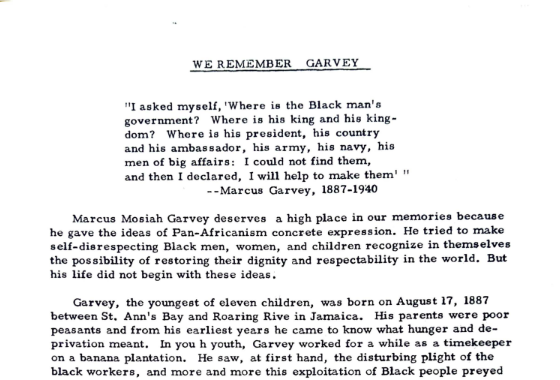
A statement issued by the Political Education Division of the Pan-African Congress, USA in December 1973. The statement offers a brief biography of Garvey and explains his influence on later Pan-African movements. –Credit: Walter P. Reuther Library, Archives of Labor and Urban Affairs, Wayne State University
This documentary chronicles the life, organizing work, and legacies of Pan-Africanist leader Marcus Garvey and the Universal Negro Improvement Association. –Credit: IBW21st
A 1960 recording of the Honorable Elijah Muhammad titled “What the Muslims Want/What the Muslims Believe.” –Credit: Reelblack
